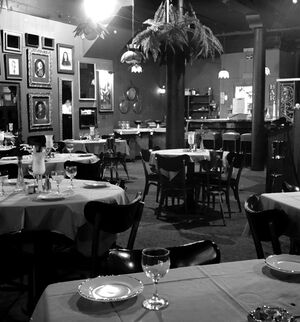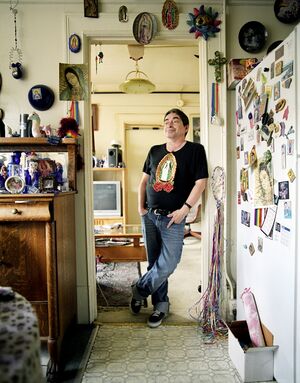Commercialized Sex and Economic Uplift
Text by Joey Plaster. Copyright (©) by C. Joey Plaster, 2009. All rights reserved.
A community borne out of “urban renewal” displacement and attendant police harassment had an intimate knowledge of the ways in which social stigma translated to economic weakness, displacement, mental illness, and drug abuse. The emerging economic bloc took pains to facilitate the economic uplift of low-income gay residents in the neighboring Tenderloin area, efforts which appeared to draw explicit connections between social and economic marginalization, the lack of services offered by the City, and the need for an emerging gay community to intervene.
In March 1969, gay activist Jose Sarria organized a variety show benefit at California Hall for a drug abuse clinic to be located in the Tenderloin. “The homosexual community has offered to undertake this effort,” read the press release, “because other groups and organizations throughout the city have long been indifferent to the tragic fact that young children are dying from drug-abuse problems in the Tenderloin.”[1]
The same year, Sarria led a costumed group, including the “Czarina of Polk St,” shaking tambourines and collecting money in pots “to provide an ample holiday dinner at Glide Churches facilities for the youth of the Tenderloin.”[2]
In 1969, one columnist referred to a “benefit auction” in area bars for a community member’s medical expenses as part of a “desire of individual homosexuals to do something constructive as a group [to] show the world that gay people can work in unison.”[3]
The San Francisco Tavern Guild Foundation also spearheaded several fundraising and service-oriented projects, including Operation Concern (1973), now known as New Leaf: Services for Our Community, the Community Thrift Store (1982), and the Godfathers (1984).
“Gay people suffer stresses that are a direct result of their minority status,” read a 1977 funding application for Operation Concern. “Being gay in a society which, by and large, still considers homosexuality a sin, a sickness or an abomination, can induce stresses that may well lead to impaired mental health.” Co-founded by the acid-mouthed Polk Street bartender Sweet Lips, Operation Concern called for a Board of Directors made up in part of the reigning Empress, Emperor, and representative from the Tavern Guild.[4]
If the Polk Street area facilitated the economic uplift of the gay community through organizations and fundraisers, it also provided opportunities for “uplift” through sexualized intergenerational pairings. It was not uncommon for young men to explore their sexuality and “transition” into gay circles through the sexualized “sponsorship” of older, economically stable men at this time, as part of interactions that ran the gambit from dinners to explicit prostitution.
A teenaged Anthony Cabello first came to Polk Street as the dinner guest of an older lover at the posh P.S. Lounge. Many of the couples, he recalled, were pairings of younger and older men. “There were older, older, older guys with younger, younger, younger guys,” he recalled. These pairings intermingled with gay men who sang show tunes at the piano, “calling each other girl ‘n Mary ‘n, being very affectionate, and there wasn’t a woman in the joint.”
In the early 1970s, as a student at a nearby college, Cabello formed lifelong relationships with the men who took him to fancy hotels, plays, and dinners. He characterized the exchange on Polk Street not as prostitution, but as part of “a proud sponsorship.” “College was expensive, and I did not mind the monetary help, but that wasn't my primary concern,” he said. “I was getting exposed to things that normally, I wouldn't have the ability to do. There were just more men who really wanted to help young students out, on Polk Street.”[5]
The upscale businesses were an appropriate setting for the economic uplift these men offered. A 1971 article noted that the restaurant “On the Q.T.” was “where Brooks-suited businessmen sit next to tee-shirted youths, where friends can talk or friendships can be made.” While pianists entertained, they ate “Scalloped Chicken, Beef Burgandy” and “Frog Legs cooked in a wine sauce” in a dining room decorated with “chandeliers disguised as hanging baskets of flowers.”[6]
The bars that allowed prostitution were “civilized” and ordered. The Cloud Seven bar, which “turned” gay in 1962, was outfitted with numbered tables and lip-shaped phones by the late 1960s, according to one narrator. “The johns were at the tables and the hustlers were all up on the bar,” he said. “And the people at the table would call the bar and say, ‘I’d like to talk to the third guy from the end,’ and say, ‘I’m over at table seven.’ So the guy goes to table seven and they have a few quick words and out they go.”[7]
- ↑ Jose Sarria papers, GLBT Historical Society, “Press Conference” Box 13.
- ↑ Tequilla Mockingbird, “The Bar Tour,” Vector Magazine, July1969.
- ↑ Tequila Mockingbird, “The Bar Tour,” Vector Magazine, August 1969.
- ↑ Tavern Guild of San Francisco (TGSF) Collection, San Francisco GLBT Historical Society.
- ↑ Interview with Anthony Cabello by Joey Plaster, 2008.
- ↑ “The Bay Gourmet.”
- ↑ Anonymous interview by Joey Plaster, 2008.

